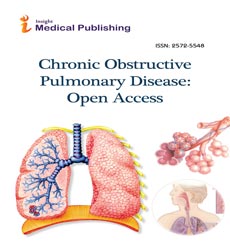Smoking Cessation among U.S. Adult Smokers with and Without Chronic Obstructive Pulmonary Disease, 2018
Mache Tsadik
College of Health science, School of public health, Mekelle University, Ethiopia
Received Date: 2022-03-02 | Accepted Date: 2022-03-11 | Published Date: 2022-03-31Mache Tsadik
College of Health science, School of public health, Mekelle University, Ethiopia
Received date: 2022-03-02 | Accepted date: 2022-03-11 | Published date: 2022-03-31
Visit for more related articles at Chronic Obstructive Pulmonary Disease: Open Access
Abstract
Introduction More than 3 of 5 U.S. adults who have ever smoked cigarettes have quit. This study assesses the latest estimates of smoking cessation among U.S. adults with and without chronic obstructive pulmonary disease who have ever smoked cigarettes (ever smokers). Methods Data from 161,233 ever smokers (12.8% with chronic obstructive pulmonary disease) in the 2018 Behavioral Risk Factor Surveillance System were analyzed in 2020. Weighted percentages of quit ratios (percentage of ever smokers who quit smoking), past-year quit attempts (≥1 day), and recent successful cessation (quit ≥6 months ago) by selfreported physician-diagnosed chronic obstructive pulmonary disease status were obtained from multivariable logistic regression analyses, with adjustment for sociodemographic characteristics, health risk behaviors, depression, and asthma. Results Adults with chronic obstructive pulmonary disease who smoked had greater age-adjusted past-year quit attempts (68.8% vs 64.3%) but lower recent successful cessation (4.5% vs 5.8%) and quit ratio (53.2% vs 63.9%) than those without chronic obstructive pulmonary disease. After adjusting for covariates, adults with chronic obstructive pulmonary disease who smoked had a significantly higher percentage of past-year quit attempts but similar recent successful cessation and a significantly lower lifetime quit ratio than their counterparts without chronic obstructive pulmonary disease. Conclusions These findings suggest that individuals with chronic obstructive pulmonary disease who try to quit smoking may be less likely to succeed than those without chronic obstructive pulmonary disease. Evidence-based treatments for smoking cessation remain an important component of a comprehensive approach to helping all adults to quit and are a particularly important element of chronic obstructive pulmonary disease management and care.
Select your language of interest to view the total content in your interested language
Open Access Journals
- Aquaculture & Veterinary Science
- Chemistry & Chemical Sciences
- Clinical Sciences
- Engineering
- General Science
- Genetics & Molecular Biology
- Health Care & Nursing
- Immunology & Microbiology
- Materials Science
- Mathematics & Physics
- Medical Sciences
- Neurology & Psychiatry
- Oncology & Cancer Science
- Pharmaceutical Sciences
